Your podcast discovery platform
Curious minds select the most fascinating podcasts from around the world. Discover hand-piqd audio recommendations on your favorite topics.

piqer for: Globalization and politics Global finds
I am an Australian freelance journalist focussing on conflicts, politics, and warzones around the world. I have been working as a journalist for over 5 years, having reported from Australia, Germany, China, Egypt, Palestine, and Ukraine. I am especially interested in the way that new technologies are being used in conflict zones in unexpected and often disturbing ways. During my time working as a journalist, I also co-founded open-source war reporting site Conflict News.
Syria Is Threatening To Break The Aid World
As another month passes, with thousands more killed in Syria, underfunded and under-resourced aid organizations are once more pleading for additional support to help those affected by the war. Still, aside from the lack of money, these organizations face yet another problem — one that calls into question the way aid is delivered into conflict zones.
How do you deliver food, supplies, and medicines to the needy without indirectly supporting those who are fighting?
In the case of Syria, much of the aid to the country is funneled through regime-held areas, and invariably Assad's government has the final say on when and where aid can be delivered. Moreover, the UN Office for the Coordination of Humanitarian Affairs (OCHA) has been accused of whitewashing regime war crimes in an effort to be allowed to continue to deliver aid to the country. As well, ample social media evidence exists of almost all armed groups in the conflict confiscating humanitarian aid and using it for the benefit of their own fighters.
For years, journalists have reported on how these organizations’ desire to stay in the good graces of the Syrian government has skewed aid delivery and caused them to whitewash Assad’s behavior.
Writing for Foreign Policy, David Kenner explains in detail these dilemmas and explores the thoughts of the aid organizations themselves. He looks at the way in which organizations like the UN and the ICRC are forced to navigate difficult political realities, of both their donor states and the warzones in which they work.
At the heart of this lies a single moral problem: if aid can't be delivered fairly, should it be delivered at all?
